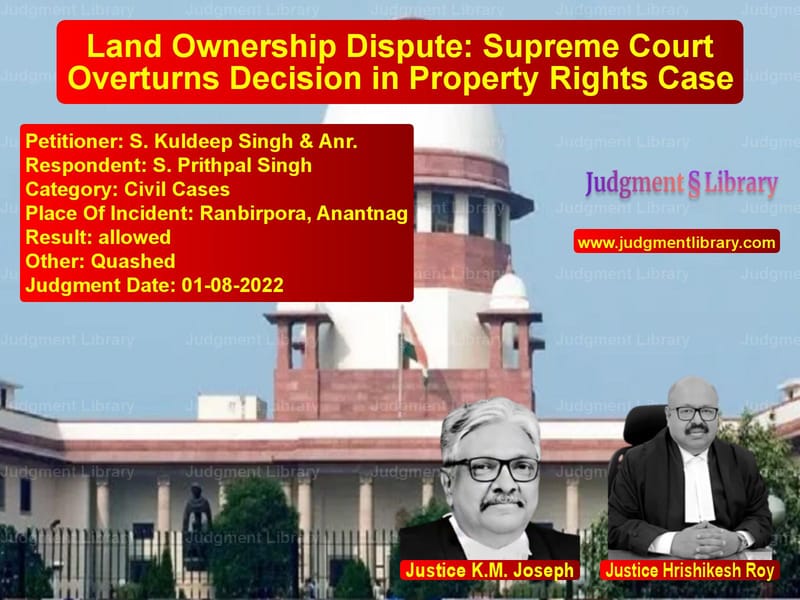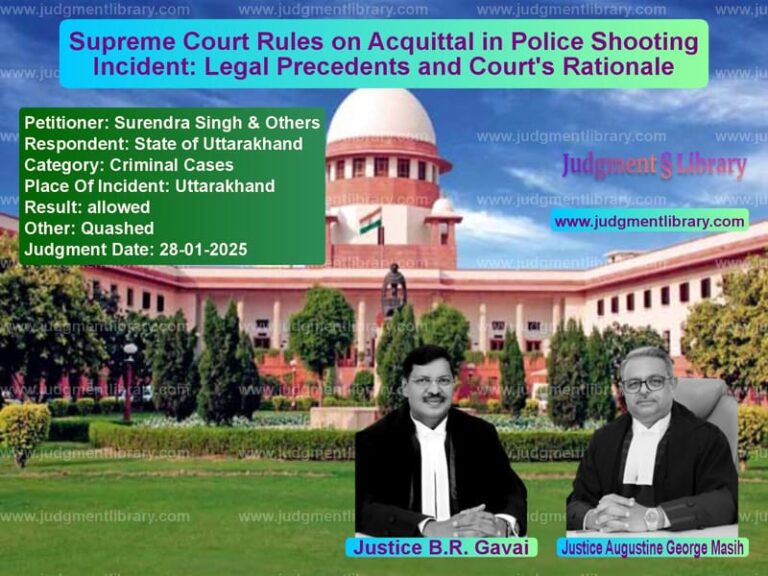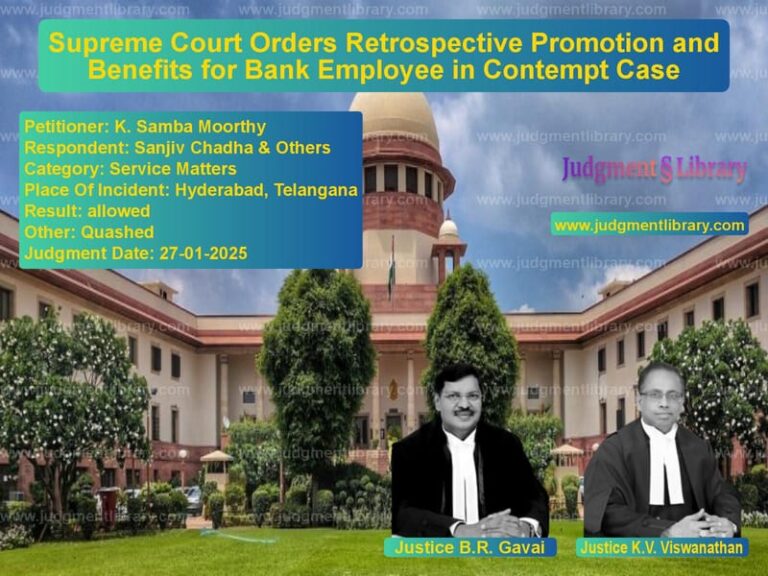Land Ownership Dispute: Supreme Court Overturns Decision in Property Rights Case
The case of S. Kuldeep Singh & Anr. vs. S. Prithpal Singh revolved around a long-standing property dispute concerning ownership rights in the village of Ranbirpora, Anantnag. The core issue was whether the plaintiff, claiming to be the adopted son of the original landowner, had legal rights over 11 Kanals and 15 Marlas of land based on a compromise deed. The Supreme Court ultimately ruled against the plaintiff, emphasizing that ownership rights must be backed by legally valid documents.
Background of the Case
The dispute arose over land measuring 11 Kanals and 15 Marlas, part of Survey Nos. 1829 and 1838, located in Ranbirpora, Anantnag. The appellants, Kuldeep Singh and his sister, are the biological children of the late S. Sucha Singh, the original owner of the land. The respondent, Prithpal Singh, claimed to be the adopted son of Sucha Singh and sought ownership rights based on a compromise deed dated 18.12.1975.
The dispute traces its origin to a settlement between Prithpal Singh and Abdul Jalil Khan, a tenant on the land. This settlement was allegedly endorsed by Sucha Singh, leading Prithpal Singh to claim ownership over the disputed land.
Legal Issues Before the Court
The Supreme Court examined several key legal issues:
- Whether the compromise deed of 1975 conferred legal ownership on the plaintiff.
- Whether the compromise required mandatory registration under the Registration Act.
- Whether the order of the Deputy Commissioner, endorsing the compromise, was legally valid given that the Jammu & Kashmir Agrarian Reforms Act, 1972, was under suspension at that time.
- Whether the principle of estoppel applied against the appellants in challenging the compromise deed.
Arguments Presented
Petitioners’ (Appellants’) Arguments
- The appellants argued that the compromise deed did not constitute a valid transfer of ownership.
- The compromise was recorded during the suspension of the Jammu & Kashmir Agrarian Reforms Act, making it legally null and void.
- The transaction lacked mandatory registration under the Registration Act, rendering it unenforceable.
- The land was an orchard, which was excluded from the purview of the agrarian reforms, further undermining the plaintiff’s claim.
- The compromise merely settled tenancy rights and did not create any ownership rights for the plaintiff.
Respondent’s (Plaintiff’s) Arguments
- The plaintiff contended that the compromise deed was a legally binding agreement that had been acknowledged by Sucha Singh.
- Since Sucha Singh had endorsed the compromise, it amounted to an implicit transfer of ownership.
- The appellants, being legal heirs of Sucha Singh, were estopped from challenging the compromise decades later.
- The plaintiff argued that the compromise was a “family arrangement” and, therefore, did not require formal registration.
Supreme Court’s Observations
On the Compromise Deed
The Supreme Court, comprising Justice K.M. Joseph and Justice Hrishikesh Roy, analyzed whether the compromise deed constituted a valid transfer of ownership.
“The compromise between the Plaintiff and Abdul Jalil Khan (tenant) was recorded in a proceeding for correction of revenue records under the 1972 Act and the Rules. It was not a deed of ownership transfer.”
The Court found that the compromise merely acknowledged tenancy adjustments and did not constitute a legal transfer of property.
On the Requirement of Registration
The Court ruled that the compromise deed required registration since it involved an interest in immovable property.
“Since the compromise created ownership rights for the first time, it was required to be registered under Section 49 of the Registration Act and Section 138 of the Jammu & Kashmir Transfer of Property Act.”
Since the document was not registered, the Court held that it had no legal validity in conferring ownership.
On the Suspension of the 1972 Agrarian Reforms Act
The Court noted that the compromise and the Deputy Commissioner’s endorsement took place while the 1972 Act was under suspension.
“The Deputy Commissioner’s order dated 24.12.1975 was passed when the 1972 Act was under suspension. As a result, the order lacked jurisdiction and was legally null and void.”
Since the legal framework under which the compromise was recorded was itself not in operation, the Court ruled that the order had no legal standing.
On the Principle of Estoppel
The plaintiff had argued that the appellants were estopped from challenging the compromise since Sucha Singh had acknowledged it. The Court rejected this argument, stating:
“Equity follows the law. If a legal document is invalid due to statutory requirements, estoppel cannot override legal principles.”
The Court ruled that the appellants were not bound by the compromise deed as it did not satisfy legal formalities.
Judgment and Its Implications
The Supreme Court set aside the previous rulings and ruled in favor of the appellants.
- The compromise deed was declared invalid due to the lack of registration.
- The Deputy Commissioner’s order endorsing the compromise was deemed null and void as it was passed under a suspended legal framework.
- The plaintiff’s claim of ownership was dismissed, and the appellants’ rights over the property were upheld.
Significance of the Judgment
- Reinforces the Need for Registration: The ruling emphasizes that any transfer of immovable property must be documented through legally valid and registered instruments.
- Prevents Abuse of Suspended Laws: The judgment ensures that legal processes are not manipulated during periods when relevant laws are not in force.
- Protects Lawful Property Owners: The decision safeguards legal heirs from losing property rights based on unverified or informal settlements.
Conclusion
The Supreme Court’s ruling in S. Kuldeep Singh & Anr. vs. S. Prithpal Singh is a landmark judgment in property law. It clarifies the legal requirements for ownership transfers and prevents misuse of informal agreements. By upholding the principles of statutory compliance and due process, the Court ensures that land ownership disputes are resolved fairly and lawfully.
Petitioner Name: S. Kuldeep Singh & Anr..Respondent Name: S. Prithpal Singh.Judgment By: Justice K.M. Joseph, Justice Hrishikesh Roy.Place Of Incident: Ranbirpora, Anantnag.Judgment Date: 01-08-2022.
Don’t miss out on the full details! Download the complete judgment in PDF format below and gain valuable insights instantly!
Download Judgment: s.-kuldeep-singh-&-a-vs-s.-prithpal-singh-supreme-court-of-india-judgment-dated-01-08-2022.pdf
Directly Download Judgment: Directly download this Judgment
See all petitions in Property Disputes
See all petitions in Succession and Wills
See all petitions in Landlord-Tenant Disputes
See all petitions in Judgment by K.M. Joseph
See all petitions in Judgment by Hrishikesh Roy
See all petitions in allowed
See all petitions in Quashed
See all petitions in supreme court of India judgments August 2022
See all petitions in 2022 judgments
See all posts in Civil Cases Category
See all allowed petitions in Civil Cases Category
See all Dismissed petitions in Civil Cases Category
See all partially allowed petitions in Civil Cases Category







